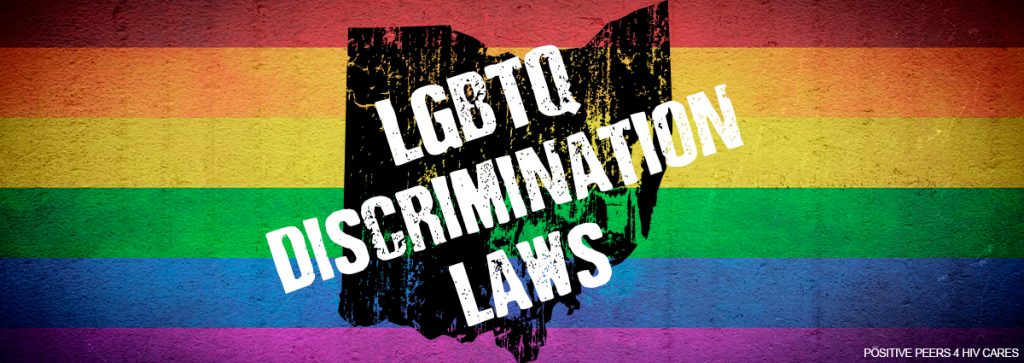
By: Jennifer McMillen Smith, LISW-S, HIV Social Worker at MetroHealth Medical Center and medically reviewed by Ann K. Avery, MD, Infectious Disease Physician at MetroHealth Medical Center
It’s legal for same-sex couples to get married. Cities in Ohio and across the country have banned discrimination against LGBTQ people. That must mean it’s all good, right?
Don’t be so sure. While those are good reasons to celebrate, there’s still much work to be done. Discrimination happens in many ways against people because they are LGBTQ is still legal across much of the United States — and much of Ohio for that matter.
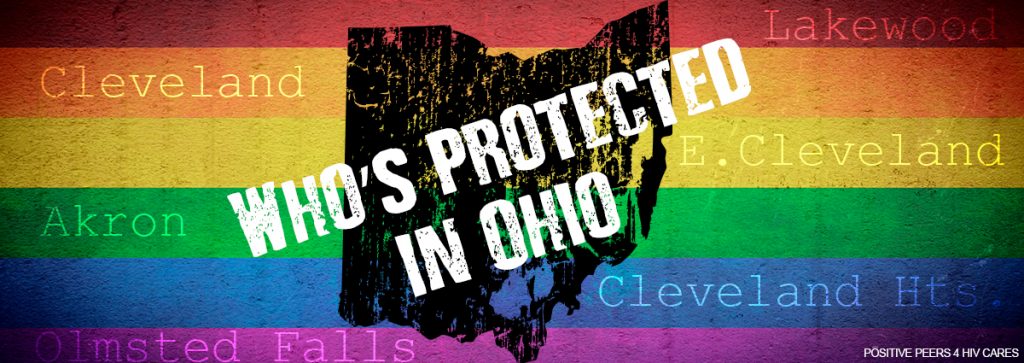
Who’s protected in Ohio
Cleveland, East Cleveland, and Cleveland Heights are among 19 Ohio cities that forbid discrimination against LGBTQ people in employment, housing, and public accommodations like stores, parks, and movie theaters, according to Equality Ohio.
Here’s the full list of 19:
| Akron
Athens Bexley Bowling Green Cincinnati |
Cleveland
Cleveland Heights Columbus Coshocton Dayton |
East Cleveland
Lakewood Kent Newark Olmsted Falls |
Oxford
Toledo Yellow Springs Youngstown |
People in these cities can file LGBTQ discrimination complaints. People living everywhere else in Ohio are not so fortunate — because there aren’t state laws protecting LGBTQ people.
Think about that for a minute: You could be trans in Cleveland and be protected against discrimination in a local restaurant, but if you traveled to visit a cousin 30 miles away in an unprotected area of Ohio, you’d be out of luck. You could go into a restaurant and the owners could say, “Sorry, we don’t serve trans people here” — and it would be legal.
You could have a good job in Cleveland and get transferred to an unprotected part of the state. A new boss could come in and say, “Sorry, I cannot work with lesbians. You’re fired.” You could try to buy or rent a home and get refused for the same reason. And it would all be legal.
If you think that needs to change, you’re right. We’ll talk more about that later, but first, we need to discuss what LGBTQ discrimination looks like. After all, not everybody follows the laws in areas where discrimination is illegal.
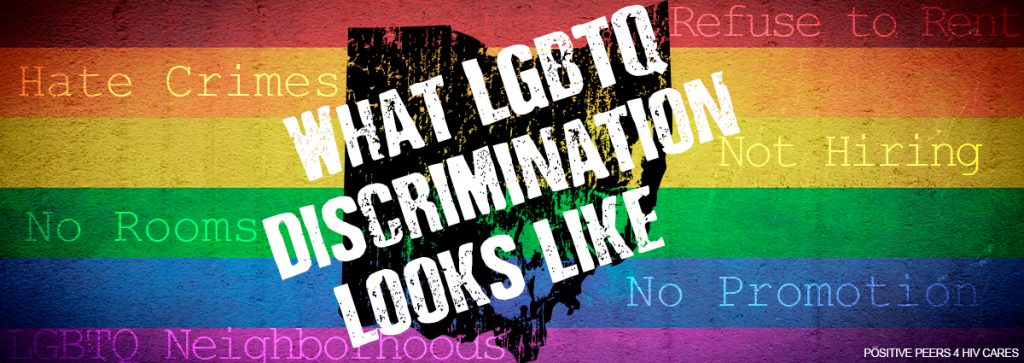
What LGBTQ discrimination looks like
If you live in one of the 19 protected cities in Ohio, you shouldn’t just assume everybody will play by the rules. Here are some examples of discrimination:
- Employment. If somebody refuses to hire or promote you because you’re a member of the LGBTQ community, that’s discrimination. The same applies to harassment, bullying, and making you the target of jokes or slurs.
- Housing. Landlords sometimes refuse to rent apartments or homes to LGBTQ people. Real estate agents and housing developers may steer LGBTQ people into certain neighborhoods or decline to work with them. Check out our blog post on your housing rights.
- Public accommodations. Some restaurants may not serve LGBTQ people. Hotels may refuse to provide rooms for the night. Country clubs may keep out certain groups. This is all discrimination.
- Hate crimes. The FBI says a hate crime involves an offense like murder, arson, or vandalism based on a victim’s race, religion, sexual orientation, ethnicity, gender, or gender identity. Note that some ordinances cover sexual orientation but don’t apply to gender identity.
If your city has an ordinance forbidding LGBTQ discrimination, it should have an office or a person responsible for enforcing the rules. If it doesn’t, you can report an incident to the state Civil Rights Commission.
Come join our private, stigma-free, supportive community.
Health management tools with medication & appointment reminders.
Social networking in a community conversation & private chats.
Help ban LGBTQ discrimination statewide
House Bill 160, the Ohio Fairness Act, has been gaining support in recent months but it still has not become law. The bill says the state’s workplace and housing discrimination protections should also apply to sexual orientation and gender identity or expression.
The bill has the support of the American Civil Liberties Union and the Ohio Chamber of Commerce. That’s a good start, but Ohio lawmakers need to hear from citizens who support the bill. Make a point of contacting your state senator and representative — and urge them to pass the bill. If you need help finding out who your local representatives are, visit this link and type in your zip code.
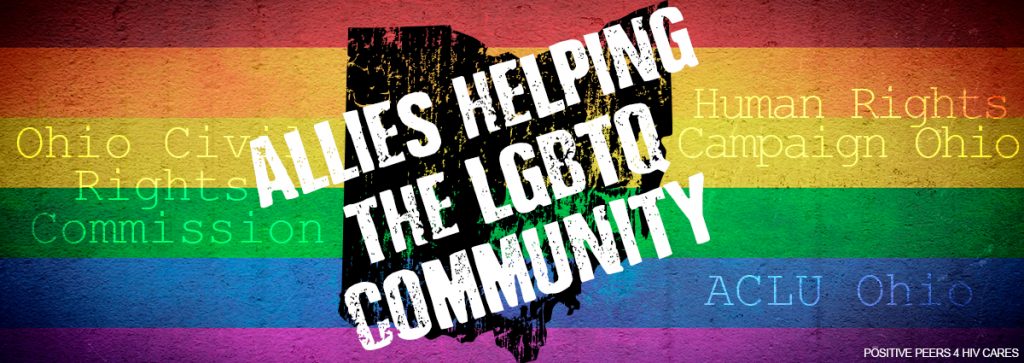
Allies helping the LGBTQ community
Check out these links to websites supporting LGBTQ people:
- Ohio Civil Rights Commission. This link can help you file a bias claim.
- ACLU Ohio. Get the latest news on LGBTQ-rights issues.
- Human Rights Campaign Ohio. Find out about progress on anti-bias legislation in Ohio.
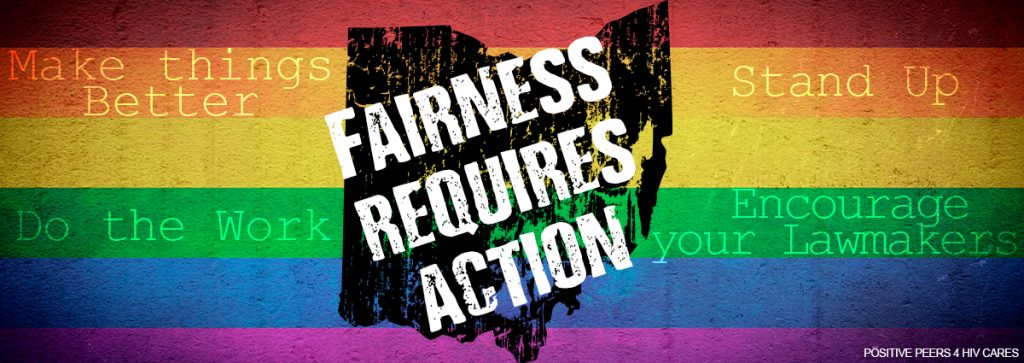
Fairness requires action
If you want to make things better for all LGBTQ people, join us and stand up for your rights and the rights of others. That means encouraging your lawmakers to stand up for fairness.
Things will never change if folks sit around waiting for somebody else to do all the work.
Related Blogs:


